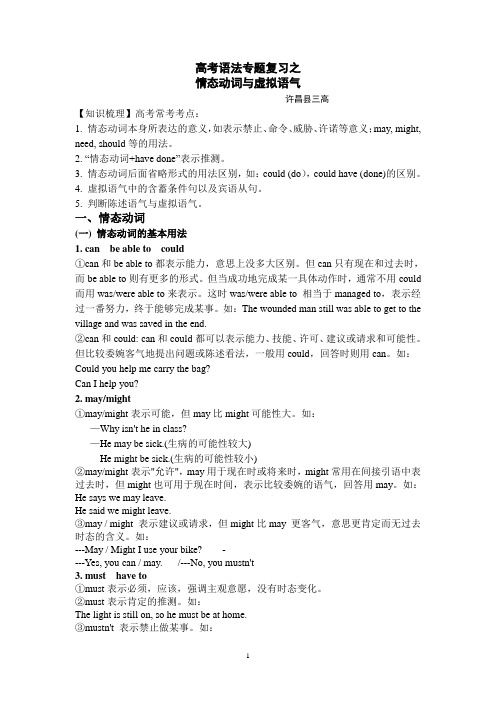2017年高考英语(四海八荒易错集)专题07情态动词和虚拟语气
- 格式:doc
- 大小:210.00 KB
- 文档页数:13

高考语法专题复习之情态动词与虚拟语气许昌县三高【知识梳理】高考常考考点:1. 情态动词本身所表达的意义,如表示禁止、命令、威胁、许诺等意义;may, might, need, should等的用法。
2. “情态动词+have done”表示推测。
3. 情态动词后面省略形式的用法区别,如:could (do),could have (done)的区别。
4. 虚拟语气中的含蓄条件句以及宾语从句。
5. 判断陈述语气与虚拟语气。
一、情态动词(一) 情态动词的基本用法1. can be able to could①can和be able to都表示能力,意思上没多大区别。
但can只有现在和过去时,而be able to则有更多的形式。
但当成功地完成某一具体动作时,通常不用could 而用was/were able to来表示。
这时was/were able to 相当于managed to,表示经过一番努力,终于能够完成某事。
如:The wounded man still was able to get to the village and was saved in the end.②can和could: can和could都可以表示能力、技能、许可、建议或请求和可能性。
但比较委婉客气地提出问题或陈述看法,一般用could,回答时则用can。
如:Could you help me carry the bag?Can I help you?2. may/might①may/might表示可能,但may比might可能性大。
如:—Why isn't he in class?—He may be sick.(生病的可能性较大)He might be sick.(生病的可能性较小)②may/might表示"允许",may用于现在时或将来时,might常用在间接引语中表过去时,但might也可用于现在时间,表示比较委婉的语气,回答用may。

高考英语复习语法专题精讲精练情态动词和虚拟语气(含练习习题及解析)一、情态动词情态动词表示说话人的语气和情绪,本身词义不全,不能单独作谓语,后面必须与动词原形一起构成谓语。
情态动词没有人称和数的变化,有的情态动词有过去式。
常见的情态动词有c an,could,may,might, must,have to,shall,should,will,would,ought to,need,dare等。
重点要掌握下列内容情态动词重点知识举例在否定句、疑问句和感叹句中,Can it be true?难道这是真的?You can't be serious!你怕不是在开玩笑吧!can 表示怀疑、惊异、不相信的态度。
Oh,dear,what on earth can this mean?哎呀,亲爱的,这究竟是意味着什么?The fire spread the building quickly but everybody was ableto escape.大火迅速蔓延到整幢大楼,但大家都逃了出来。
注意:be able to比can有更多的形式变化表示“经过努力后终于能……”When he grows up,he will be able to support his family.用be able to他长大后就能养家了。
Frank is ill.He hasn't been able to go to school for one week.弗兰克病了,已经一周没去上学了。
“cannot(can't)…too/over/enough”。
You can not be too careful.表示“无论怎么……也不(过你无论怎么小心都不为过(你越小心越好)。
分)”,用来加强语气can not but do sth.不得不;只好惯用形式may (might)as well+动词原形:不妨做……I ca n’t but choose to wait.我只好选择等待。


高考英语情态动词和虚拟语气复习【名师精讲必考语法,值得下载练习】情态动词是一种本身有一定的词义,后面加动词原形,给谓语动词增添情感色彩,表示说话人对有关行为或事物的态度和看法,认为其可能、应该或必要等。
一、情态动词的分类1.只做情态动词:must, can(could), may(might), ought to, should2.可做情态动词又可做实意动词:need, dare(dared)3.可做情态动词又可作助动词:shall, will(would)4.具有情态动词特征:have(had) to, used to, had better (not) do二、情态动词的特点1.情态动词没有人称和数的变化。
2. 情态动词后跟动词原形,否定式构成是在情态动词后面加“not”。
3. 情态动词属非及物动词,故没有被动语态。
三、情态动词的基本用法1.can/ could1) 表示能力Can you lift this heavy box?Mary can speak English fluently.此时可用be able to 代替。
can 只有一般现在时和一般过去式;而be able to 则有更多的时态。
I’ll be able to come this afternoon.注意:当表示“经过努力而成功做到某事时”不能用could, 而用was/were able to do= succeeded in doing= managedto doHe was able to go to the party yesterday in spite of the heavy rain.2) 表示可观可能性(客观原因形成的能力)。
译为“能够;可以”This hall can hold 500people at least.3) 某人或某物一时的可能性,常译为“有时(可能)会”It is usually warm in my hometown in March, but it can be rather cold sometimes.Little children can be very naughty.4) 表示请求和允许----- Can I go now?----- Yes, you can. No, you can’t.此时可与may 互换。

鹰击长空—基础不丢专题导读情态动词与虚拟语气是中学语法学习的难点和重点。
高考英语完成句子对情态动词的考查主要涉及常见情态动词的基本用法,特殊侧重于情态动词表推想的用法和特殊结构中情态动词的应用。
高考完成句子对虚拟语气的考查重点在于依据句子的语境敏捷多样地运用虚拟语气,宾语从句中虚拟语气的应用,交际用语中为表委婉而运用的虚拟语气,含蓄条件句中的虚拟语气,以及特殊句型中的虚拟语气等。
学好虚拟语气,除了驾驭基本的结构外,还要留意句子所表达的意义是与现在、过去,还是将来事实相反,看清时间状语,另外还要留意在其他结构中虚拟语气的运用。
五年高考:①情态动词与完成式;②宾语从句、同位语从句、条件句中的虚拟语气;③情态动词的推想功能;④should/can 等情态动词的基本用法。
考点聚焦:考点(1)情态动词与完成式“情态动词+have+过去分词”结构是情态动词专项考查的难点和重点,记住以下最常考查的结构:①must have done 过去确定做了某事He isn’t here. He must have missed the train. 他还未到,确定是没赶上火车。
②can’t/couldn’t have done 过去不行能做了某事He can’t have written this letter. 这封信不行能是他写的。
③may/might have done 过去可能做了某事You may (might) have read about it. 你可能在报上已经读到这件事了。
④needn’t have done原来没有必要做而实际做了某事He needn’t have worried about it. 他本不必为此事担忧。
⑤could have done原来能够做而实际没有做某事You could have been more careful. 你原来可以更细心的。
⑥should/ought to have done原来应当做而实际没有做某事I should have finished the work earlier. 我应当早一点完成这项工作的。

2017年全国高考英语真题分类汇编---情态动词和虚拟语气解析2017年情态动词和虚拟语气高考真题1. (北京卷21). Samuel, the tallest boy in our class, ______ easily reach the books on the top shelf.A. mustB. shouldC. canD. need答案:C, 分析:本句考查情态动词,根据Samuel后的同位语the tallest boy in our class,说明这孩子有能力够到书架顶上的书,而A. must表主观上的“必须”或肯定推测,译成“肯定、一定”;B. should表责任、义务,译成“应该”;C.can表能力,译成“能够”或表推测,语气弱于must,译成“可能”,这里取能力用法;D. need 需要。
句意:“Samuel,这个我们班最高的男孩,能够到书架顶上的书。
”所以选C。
2. (北京卷34). If the new safety system _______ to use, the accident would never have happened.A. had been putB. were putC. should be putD. would be put答案:A, 分析:根据后一句would never have happened判断这是与过去事实相反的虚拟语气,if条件句要用had done形式,句意:“如果新的安全系统被使用的话,这场事故就不会发生。
”所以选A.3.(天津卷2). My room is a mess, but I __________clean it before I go out tonight. I can do it in the morning.A. daren’tB. shouldn’tC. needn’tD. mustn’t答案:C, 分析:本句考查情态动词,A. daren’t不敢;B. shouldn’t 不应该;C. needn’t=don’t need to do=don’t have to没必要,可用于must的一般疑问句的否定回答中,例:---Mr. White, must I hand in my assignment at once? ---Y es. You must./No. Y ou needn’t;D. mustn’t表完全禁止,用于法律法规。
2017年高考题【2017·北京卷】21。
Samuel, the tallest boy in our class,______ easily reach the books on the top shelf。
A。
must B. should C。
can D。
need【答案】C考点:考查情态动词【名师点睛】常用的情态动词有can,may,must,need,should等1. can 的用法:①表示能力“能,会” eg:He can speak a little Japanese。
他会说一点日语。
②表示请求或许可“可以” eg:Can I help you? 要我帮忙吗?③表示猜测“可能” eg: Where can she go now? 她可能到哪里去了呢?2.may 的用法:①表示请求或允许“可以”“准许" eg: May I go home,please?请问我可以回家吗?②表示可能性“ 可能"、也许” eg: I think it may rain this afternoon. 我想今天下午可能下雨。
注:might为may的过去式,但也可以代替may,语气较为婉转客气或更加不肯定。
eg:①He might not come today.今天他也许不来了。
(语气不肯定)②You might also get a headache when you work too hard,当你工作太努力时,你也可能患头痛3。
must的用法:①表示义务、必要或命令“必须、应该” eg: You must come early tomorrow.你明天得早来。
②表示推测时“肯定,一定” eg: They must be at home。
The light is on 他们肯定在家,灯亮着呢.③must not 禁止,不许eg:You must not tell lies。
你不许撒谎。
专题07 情态动词和虚拟语气【考向解读】情态动词用来表示说话人的情绪、态度或语气,在情景交际和虚拟语气中得到广泛使用。
情态动词为中学英语考试大纲要求内容,并且是高考内容中的难点之一。
其主要考点主要集中在情态动词的基本意义及“情态动词+have done”结构的用法。
【命题热点突破一】情态动词的基本用法1.can和could的用法(1)表示“能力”。
(2)表示理论上的可能性,“有时候可能会”,用于肯定句中。
(3)表示礼貌地请求,意为“能,可以”。
could可代替can,表示委婉的语气。
(4)cannot...too/enough表示“无论……也不过分”;“越……越好……”。
No one can be compared with Yao Ming in playing basketball.在打篮球方面,无人能与姚明相媲美。
It is usually warm in my hometown in March,but it can berather cold sometimes.我的家乡三月份通常很暖和,但有时候也会相当冷。
You can’t be too c areful while driving.开车时越小心越好。
—Could I use your bike tomorrow?——明天我可以用一下你的自行车吗?—Yes,you ca n./No,I’m afraid not.——是的,你可以。
/不,恐怕不行。
2.may和might的用法(1)表示允许、许可、请求,might比may的语气更委婉。
当may用于疑问句时,其否定回答:No,...mustn’t。
(2)may as well+动词原形“最好;倒不如……”。
—May I take this book out of the reading room?——我可以把书拿出阅览室吗?—No,you mustn’t.You read it in here.——不,绝不可以。
专题07 情态动词和虚拟语气1. This does not mean that we have to write or call our friends every day.It does mean,however,that we care enough about our friends to find out how they are doing from timeto time.【解析】考查情态动词。
根据语境特别是前面的have to可知,此处需要一个情态动词,should应该,语气合适;如用must,语气太强;may/can语气太弱。
【答案】should2. I was really happy to be writing a detective story.But after the first few pages,I just write any more.【答案】couldn't3. I'm Captain John Blanchard.You be Miss Hollis.I am glad to meet you here.【解析】考查情态动词。
你一定是Hollis女士。
根据语境可知此处要用must表示肯定推测。
【答案】must4. He walked in as if he (buy) the school,and the word quickly got around that hewas from New York City.【解析】考查虚拟语气。
在人称代词he后,显然是作谓语;又因他不可能是买下了这个学校,故应用虚拟语气,与过去事实相反,故填had bought。
【答案】had bought5. I recommend that you (try) .【解析】考查虚拟语气。
recommend, suggest, request, command等后面的宾语从句使用虚拟语气,即should +动词原形,should可省略。
【答案】(should) try6. Tom:Sandy.It seems that only half of the students passed the final exam.Sandy:Really? The exam have been very difficult this time.【解析】考查情态动词。
答句意为“这次的考试一定很难”。
must have done肯定……,表示对过去的肯定猜测。
【答案】must7. It's a pity you were late,otherwise you (see) the film star Rain from Korea.【解析】考查虚拟语气。
根据otherwise判断此处是含蓄型的虚拟语气,表示对过去的虚拟时,主句用would have done。
【答案】would have seen8. All the students put on masks before going to school in case they are infectedwith flu virus.【解析】考查情态动词。
所有学生应在去学校之前带上口罩以防感染禽流感。
shall用于第二、第三人称,表示说话人给对方命令、警告、允诺或威胁。
【答案】shall9. Had the government limited the sales of cars much earlier,traffic jam and pollution not be so serious now.【答案】would10. If you will stay here longer,you may.But you leave before this weekend.【解析】考查情态动词。
根据but可知,此处强调说话人主观上认为“必须”做某事,要求对方必须在周末前离开。
must必须。
【答案】must易错起源1、情态动词的词汇义辨析例1.I have worried before I came to the new school, for my classmates here are veryfriendly to me.【解析】句意:在来到新学校前我本不必担心,因为在新学校我的同班同学对我很友好。
考查情态动词。
needn't have done...本不必做的事做了。
【答案】needn't【名师点睛】情态动词的基本用法I.can(could)1.表示体力或脑力方面的能力,或根据客观规定律能做某事的能力,意思是“能够”。
can表“能够” 时,既可指将来,也可指现在。
be able to 在表示能力时与can同义,但可用:于各种时态,强调通过努力克服困难成功地做某事,相当managed to do 或succeeded in doing.例如:No one can (is able to) finish such a difficult thing.He can speak English.I can go there now.With the help of the fire men ,the the trapped peopel was able to leave the burning buildung(不能用could)2.表示许可、允许,在疑问句中表示“请求,许可”,否定句中表示“不许”,此时可与may通采用,有时cannot可以表示“禁止”,相当于“mustn’t”,例如:May(Can)I help you?That sort of thing can’t go on !You can’t ( mustn’t, are not allowed to ) play computer games again.3.表示推测,强调客观可能性“可能、会”,can多用于疑问句和否定句,表示猜测时,情态动词后可用进行式或完成式。
—There comes a man. Who can it be?—It must be our English teacher.—No, it can’t be him. He has gone to America!He can’t have gone there alone.4.could表示“能力”“可能性”“许可”,为can的过去式。
一般用于委婉、客气地提出问题或陈述看法,此时can,could并没有时间上的差别,只是 could的语气更客气些。
回答时用原形回答。
—Could I borrow your English dictionary?—Of course you can. Go a head.Ⅱ.may,might( might 为 may 的过去式)1.表示许可,有“可以”的意思,询问或说的一件事可不可以做,有时可以用can互换。
其否定式 may not表示“不可以、禁止、阻止”等,常用must not =mustn’t代替,may用于疑问句中,回答这种问题时,多避免用may,而用其他形式,以免显得口气太严峻或不客气。
例如:—Mum, may I go to the cinema tonight?—Yes, you may. (No, you mustn’t/ you’d better not. ) 比较:—Yes, please/please don’t.2.表推测、或许、可能的意思,表示一件事或许会发生,只用在陈述包中。
例如:Her parents may come to see her tomorrow.3.may句式用来表示祝愿。
例如:May you succeed! = I hope you may succeed.May you be happy, healthy and wealthy!4.might是may的过去式,表示可以做的事或可能发生的事;主句谓语动词是过去时态时用 might不用may。
might一般用于比may的口气委婉,或表示现实的可能性更小一些的语境中.例如:Our teacher suggested a few books which I might buy.I wonder if I might buy some sugar now.Ⅲ.must1.表示必须要做的事,意为“必须”,否定式mustn’t表示“不应该,不许可,禁止”等。
因此,在回答带有must的问句时,不用mustn’t,而用needn’t或don’have to.例如:—Must I hand in the paper now?——Yes,you must.—No,you needn’t./you don’t have to.2.must在表示“必须”时与have to相近,have to比较强调客观的需要,must着重主观看法。
另外 must 不像have to那样能有更多的时态。
例如:Tom, you must stay at home. (命令或叮嘱)I have to stay at home to look after my baby. (客观需要)3.表推测,暗含很大的可能性,意为“一定”只用于“肯定句”中。
例如:I think there must be a mistake.4.偏偏、硬要、干嘛(指做令人不快的事)。
例如:Hey, beys Must you shout so loudly?Ⅳ.Shall1.用于二、三人称陈述句中。
表示说话人给对方的命令、许诺、警告、强制、威胁、决心等。
在疑问句中,表示征询听话人是否愿意。
例如:You shall have my answer tomorrow. (允许)He shall be sorry for it one day, I tell you. (警告)You shall do as I tell you. (命令或分咐)Shall you go with me? (征询意见)2.用于一、三人称的疑问句中,表示说话人征求对方的意见和向对方请示。
例如:Shall we begin our class?When shall my father be able to leave hospital?V. should 和 ought toshould表示劝告、建议常作“应当”讲,与ought to有时可互换,ought to更注重一些责任义务。
should 表示预测可能性,并译作“可能,(按道理)应该”;而ought to则表示非常可能。
Should用于委婉、谦逊地提出意见或建议,ousht to可表示因责任、义务等该做的事。